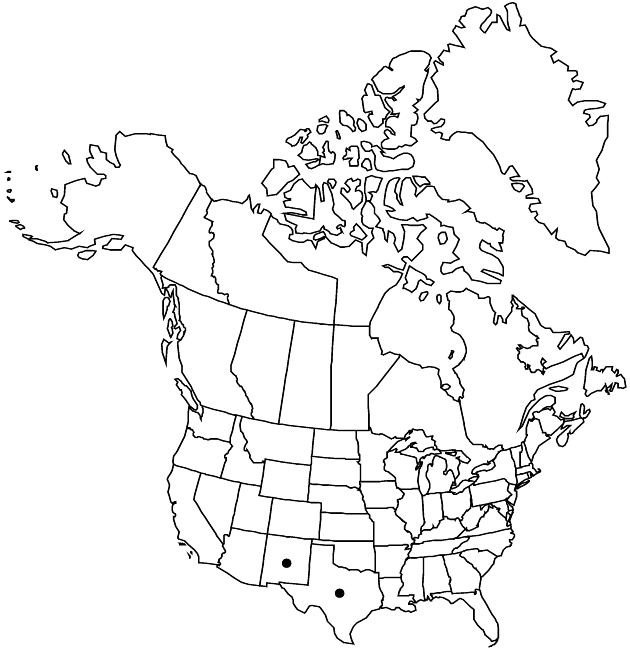Difference between revisions of "Lorandersonia spathulata"
Sida 21: 1625. 2005.
FNA>Volume Importer |
GeoffLevin (talk | contribs) m (Corrected accepted name authorities to match printed version) |
||
| (2 intermediate revisions by one other user not shown) | |||
| Line 1: | Line 1: | ||
{{Treatment/ID | {{Treatment/ID | ||
|accepted_name=Lorandersonia spathulata | |accepted_name=Lorandersonia spathulata | ||
| − | |accepted_authority=(L. C. Anderson) Urbatsch | + | |accepted_authority=(L. C. Anderson) Urbatsch, R. P. Roberts & Neubig |
|publications={{Treatment/Publication | |publications={{Treatment/Publication | ||
|title=Sida | |title=Sida | ||
| Line 8: | Line 8: | ||
}} | }} | ||
|common_names=Guadalupe rabbitbrush | |common_names=Guadalupe rabbitbrush | ||
| + | |special_status={{Treatment/ID/Special_status | ||
| + | |code=E | ||
| + | |label=Endemic | ||
| + | }} | ||
|basionyms={{Treatment/ID/Basionym | |basionyms={{Treatment/ID/Basionym | ||
|name=Chrysothamnus spathulatus | |name=Chrysothamnus spathulatus | ||
| Line 38: | Line 42: | ||
-->{{#Taxon: | -->{{#Taxon: | ||
name=Lorandersonia spathulata | name=Lorandersonia spathulata | ||
| − | |authority=(L. C. Anderson) Urbatsch | + | |authority=(L. C. Anderson) Urbatsch, R. P. Roberts & Neubig |
|rank=species | |rank=species | ||
|parent rank=genus | |parent rank=genus | ||
| Line 51: | Line 55: | ||
|publication title=Sida | |publication title=Sida | ||
|publication year=2005 | |publication year=2005 | ||
| − | |special status= | + | |special status=Endemic |
| − | |source xml=https:// | + | |source xml=https://bitbucket.org/aafc-mbb/fna-data-curation/src/2e0870ddd59836b60bcf96646a41e87ea5a5943a/coarse_grained_fna_xml/V19-20-21/V20_394.xml |
|tribe=Asteraceae tribe Astereae | |tribe=Asteraceae tribe Astereae | ||
|genus=Lorandersonia | |genus=Lorandersonia | ||
Latest revision as of 13:19, 7 March 2024
Shrubs, 70–150 cm. Stems ascending to erect, greenish when young, becoming tan to gray, fastigiately branched proximally (± angled from leaf bases), finely scabrous, eglandular. Leaves ascending; blades sometimes appressed, midnerves plus 2 fainter collateral nerves evident, oblanceolate to spatulate, 25–50 × 1–3 mm, flat, margins scabrellous, apices acute to acuminate, faces scabridulous. Heads in corymbiform arrays, clusters to 5 cm wide. Involucres turbinate to subcylindric, 5–7.2 × 1.5–2.3 mm. Phyllaries 13–16 in 3–4 series, in weak vertical ranks, mostly tan, midnerves evident throughout, slightly keeled or convex, elliptic to lanceolate, 0.8–6 × 0.7–1.2 mm, unequal, margins narrowly scarious, entire, apices acute to acuminate, outer often subapically thickened and ± herbaceous, faces glabrous. Receptacles without scales. Ray florets 0. Disc florets 4–5; corollas 4–5 mm, glabrous, lobes 1.5–2.5 mm; style branches exserted, 1.8–3 mm, appendages attenuate, 0.9–1.6 mm. Cypselae tan, narrowly obovate, 2–3 mm, 4–6 ribbed, faces sparsely hairy; pappi whitish tan, 3–4 mm. 2n = 18.
Phenology: Flowering late summer–fall.
Habitat: Loamy soils in pinyon, juniper, and oak woodlands
Elevation: 1700–2200 m
Discussion
Selected References
None.
